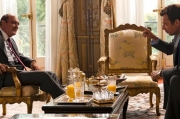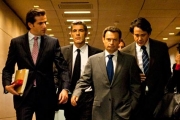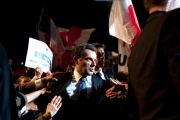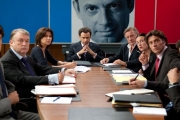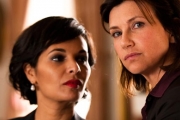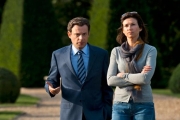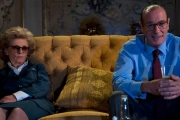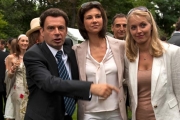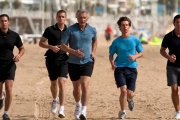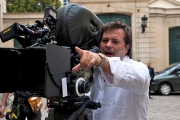Synopsis
The day is May 6, 2007, France’s run-up to the presidential elections. As the French are getting ready to go to the polls to elect their new president, presidential candidate Nicolas Sarkozy has shut himself away in his home. Though Sarkozy soon learns he has won the election, he is alone, gloomy and despondent. For hours he has been trying to reach his wife Cécilia, to no avail. The last five years start to unfurl before our eyes, recounting Sarkozy’s unstoppable ascent to power, riddled with in-party backstabbing, media manipulation, riots, sarcastic confrontations. The Conquest: the story of a man who reaches power and loses his wife.
Cast & Crew
Director : Xavier Durringer
Screenwriter : Patrick Rotman
Cinematographer : Gilles Porte
Starring : Denis Podalydès, Florence Pernel, Bernard Le Coq, Hippolyte Girardot, Samuel Labarthe, Michèle Moretti, Saïda Jawad, Mathias Mlekuz, Grérory Fitoussi, Pierre Cassignard, Dominique Besnehard, Emmanuel Noblet, Michel Bompoil, Gérard Chaillou, Nicolas Moreau, Yann Babille Keogh, Fabrice Cals
Schedule & Presentation
![]() Presentation by and discussion with cinematographer Gilles Porte
Presentation by and discussion with cinematographer Gilles Porte
Friday, March 30 – 9:30 p.m at the Byrd Theater ~ ![]() 1h45 ~ Parental Guidance
1h45 ~ Parental Guidance
More informations
Choose a picture to see the filmography (source : IMDB)
![]()
Where did you get the idea to direct a movie about a president still in office?
When Eric and Nicolas Altmayer came to me with a project written by Patrick Rotman that focused on Nicolas Sarkozy’s ascent to power, I was a little worried because until then, no film had ever been made about a president in office, not even in the United States. How to overcome my own fears and paranoia to tackle such a task? Therefore, I thought that the best option was to have an honest approach and again raise the question of France’s political life. For example, we did not change the names of the characters, which involved legal issues. And the more I was told not to deal with this matter, the more excited I felt. It was necessary to make this film and to conquer uncharted territory.
What captivated you the most about directing this film?
What I found thrilling was the fact that it was about a fight within a same camp – Chirac, Villepin and Sarkozy were fighting for power. It thus read like a Shakespearean script. And what appealed to me was the extraordinary metaphor of love embodied by Cécilia Sarkozy, who for twenty years had struggled to pull the man she loved from the shadow into the light and who walked out on him for another man on the day he conquered power. Pure fiction! The essence of drama!
It was crucial to make a film which would neither blame nor praise the protagonists but portray them as sensitive, human and sometimes complex and emotionally unbalanced creatures. It is a film about politics but also about the emotional and psychological stakes involving the conquest of power. Actually I hope for the audience to leave the theatre wanting to go on discussing the dimension of the political arena. We made this film to spark a debate, to have viewers wonder why Sarkozy has moved them so much and how he managed to win over 80% of the far-right voters.
We wished to describe the infernal mechanism of the conquest: this film aims to be an eye opener.
Does the political world resemble a play?
I realized that, when it comes to the media and the “people-ization”, politicians are very much like famous actors and singers. Like artists, politicians are all about appearances: make-up, hairdo and clothes. They have speechwriters whose lines they rehearse before reciting them in front of an audience. When they are in the spotlight, they are confronted with audiences who cheer them on. Like actors, they experience loneliness before the curtain rises. In fact they are constantly in the spotlight and under the scrutiny of journalists who criticize them, whether they are on their side or their opponents’. It reminded me of a theatrical metaphor. In my view this film reflects reality. Besides, politicians are sometimes cut off from the world reality, just like stage performers. It was therefore important to show Sarkozy rehearsing in front of empty auditoriums before appearing for his audience. It was also important to see his sadness or his dismay for journalists, staging and showing the French people that he was just an ordinary man. All of this is under strict control to strike a chord with voters – a real performance.
In elevating himself to star status, Nicolas Sarkozy dramatically changed the relationship between politicians and the media and the image conveyed by politicians. He chose to play the card of transparency. For the first time in the history of French politics, a president wearing sunglasses appeared in celebrity magazines featuring his holidays and his love affair with a model! He is the first president to have staged his personal life and emotions, which is why it was possible for us to make a movie of it.
For certain scenes, did you seek for inspiration in western movies?
What is striking is that the world of politicians has the same codes as film noir movies: there are armed bodyguards equipped with earpieces, wearing dark glasses and there is a boss at the top of the pyramid. It is a little like The Godfather, which was already a metaphor for the director: politicians attack each other with vitriolic sound bites and make phone calls cupping their hand over their mouth to prevent lip-reading. It is a world in which the cult of secrecy prevails and in which subordinates and underlings are willing to fall to protect the boss, on behalf of the code of honor.
And there is pungent dialogue – especially with Chirac and Villepin who do not mince their words. That is why I used close-ups of the protagonists, as in westerns; the difference being that in my movie, it is the words that kill. I must say that being used to filming groups of men, I felt quite comfortable in this political world where Sarkozy is always surrounded by his advisers. In the history-laden halls decorated with gilded paneling, the dialogues – reminiscent of films written by Audiard – go back and forth between the protagonists in sometimes highly dramatic situations and add a humorous dimension to the movie. Sometimes, it even looks like pure comedy.
Was it hard to find the right actors?
When Denis Podalydès arrived for the audition, his bald skull covered with shoe cream, it was chemistry: he fitted into the character, spoke and moved like Sarkozy without mimicry or false posture. He had the right voice; therefore I knew his body would follow. We did not use any artificial devices or prosthesis except for make-up, as for any other actor. Denis told me right away: “I will be genuine.” And he played the character with his qualities and weaknesses, so much so that we believe him when he says something. And this symbolizes quite well the kind of man Sarkozy is. For instance, he is always incredibly serious when he says something, even when he states that he will make a retreat in a monastery and ends up on the yacht of the French multibillionaire Bolloré. But we fall for it. Denis is highly talented, both serious and pungent, a real comedian. You could almost look at Sarkozy now and think that he is the caricature of Podalydès, the actor.
Denis being the fantastic actor that he is, the rest of the cast had to be as stunning so as not to be outshined by him. Bernard Le Coq as Chirac, Samuel Labarthe as Villepin and Florence Pernel as Cécilia, all were true-to-life and matched up to Denis. They were in perfect symbiosis. They all did a great job altering their voices and their bodies, a rather risky business.
I also wanted the supporting actors, such as Hippolyte Girardot, Saïda Jawad, Mathias Mlekuz, Grégory Fitoussi and Dominique Besnehard, to have specific relationships with Nicolas Sarkozy, to serve him and speak to him in a special way… We all worked hard together, constantly doing research, communicating and discussing. Likewise, I had to work with the extras to make their cheering and touching Sarkozy believable. And it was the very passion of the crowd that galvanized Denis.
Why did you pitch for a classic staging?
We needed a classical staging; I went from tracking shots to long sequence shots on Denis Podalydès who was able to act for about four minutes non-stop. We wanted to let the actors place themselves on the set, to let them be. Even if you believe you are at the Elysée or at Beauvau, we did not actually shoot the sets; what we shot were faces and bodies. That is why there are so many wide shots, to give pre-eminence to the actors’ bodies and priority to the pacing and the movement so that no scenes were alike. By examining pictures, I noticed that the advisors were always standing, on the watch, on the alert. Thus while Villepin and Sarkozy are sitting behind their desks, their entourages are constantly in motion. The film was shot in Cinemascope, with only one camera.
How did you first respond to the offer of playing Nicolas Sarkozy?
I was immediately thrilled. Why? Because I love political movies. I had been waiting to play an actual or fictional politician for years. The realm of politics is incredibly rich with opportunity for acting, which has hardly been tapped by French cinema. Foreign movies have paved the way with films like The Queen, Il Divo, or W. Playing the current president did not bother me, nor did it curb my enthusiasm. Quite the opposite actually. I was eager to play in the present-day world, eager to get closer the fascinating character he is, whether you agree with the man’s political ideas or not.
Did you feel the need to do a lot of research, like to watch archive footage in order to get into the “character”?
Yes, I did what you usually do when you play this type of character – I listened to his voice, watched all available documentaries, studied reports and numerous pictures – and there are a ton of them. Then, little by little, I let the character take over, almost surreptitiously. Eventually he got into me, unobtrusively. We did not seek to create a carbon copy of Sarkozy, I did not try to look exactly like him, talk exactly like him or walk exactly like him. I sought to create a likeness, a character that was totally me and totally – or almost totally – Sarkozy. I once read a beautiful response from Depardieu when asked the same question, “You can’t do much about it, you just have to let go”. True, he was not talking about a character study, but I think that even when you want to play somebody like Sarkozy, you have to “let go” so as to convey the feeling that the actor and the character are free.
Are you interested in politics?
Yes, very much so. I read the “politics” section in the newspapers as if it were a daily serial. There are exciting times, and sometimes frightening ones, like nowadays.
Did you empathize with Nicolas Sarkozy?
It is important to avoid taking sides, to hush the inner voice of the citizen that votes and judges. Instead, I needed to enhance Sarkozy’s physical aspect, the political animal he is and show his daring, brisk, energetic, mysterious personality. And his sense of humor. He has a much greater sense of humor than most politicians.
How did you work on the voice?
I slowly immersed myself in it. I relentlessly repeated some sentences. I admit I tried to mimic, but it was not mere imitation, it came from within, so to speak, I let the voice settle inside my head all the while seeking the right pace rather than the right tone.
How do you avoid caricature or pastiche?
Time, focus and patience are the keys. You must listen and observe. I would watch certain TV shows endlessly, as if I were listening to music. For instance, I would watch the French TV show 100 minutes pour convaincre, which gave politicians 100 minutes to talk about their views and try to convince the audience. Never look at or listen to impersonators. Also sometimes it is a good idea to turn off the sound and focus on the body language. At times, only listen to the voice. Ignore what is going on during the presidential election. Think up imaginary situations and let the character in. Forget real facts. After all, Sarkozy becomes a fictional character in the movie.
Did you need a modicum of empathy for him, which would mean forgetting your political preferences?
Yes but I find it easy to relate to politicians. Right-winged or left-winged, I take an interest in them all. I have always been interested in Sarkozy even though I have always voted for left-wing candidates.
At times “your” Sarkozy reminds us of a Shakespearian character, some sort of King Lear, sometimes grand and moving, sometimes pathetic and abhorrent…
Shakespeare is the world’s greatest playwright of political tragedies. His characters have influenced all the theatre plays that address these issues. The cinema has also been influenced by him. Sometimes I thought of Richard III, although I had just played Richard II.
Did the clothes help you become the character?
Costume designer Jurgen Doering was incredibly helpful. He took me to a tailor in Paris where some politicians get dressed and where we found my suits. I cannot speak highly enough of key make-up artist Dominique Colladant with whom we designed the make-up and the wig, and of all the make-up artists who work with him.
Would you compare the political life to a play?
Yes, I would say that the two are very similar, though not identical. When the president goes to bed, he is still the president, whereas the actor who goes to bed no longer has anything to do with his character. You should beware of connections between theatre and politics, or even between a play and a film. It may be flattering but it also gives credit to the idea that politics is all about lying.
What was it like to work with Xavier Durringer?
There was a great sense of freedom in our work. And long takes. He is open to improvisation and ready to experiment with new things. He has a good sense of pace and comedy. We really got along well in terms of our goals and approaches. It was a collaborative effort, which helped us move forward and trust each other. And we had great fun all the while. Xavier has such a Sarkozy-like energy – but not a sarkozyist one, don’t get me wrong!



